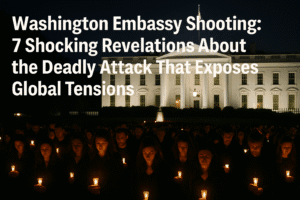Washington Embassy Shooting: 7 Shocking Revelations About the Deadly Attack That Exposes Global Tensions
On May 22, 2025, a tragic shooting outside Washington’s Capital Jewish Museum claimed the lives of Yaron Lischinsky and Sarah Milgrim, a couple connected to the Israeli Embassy, in a politically motivated attack. Elias Rodriguez, the alleged shooter, reportedly traveled from Chicago with a gun, targeting the couple while shouting slogans in support of Gaza. The incident, fueled by radicalization and extremist narratives amplified online, highlights the dangerous intersection of global conflicts and domestic violence.
Authorities have charged Rodriguez with murder, terrorism, and hate crimes, emphasizing a firm stance against antisemitism. The attack unfolded amid heightened tensions from Israel’s military operations in Gaza, prompting increased security at Jewish institutions worldwide. Despite the community’s grief, leaders call for resilience and unity over fear. The FBI continues to investigate Rodriguez’s motives and connections. This tragedy serves as a stark reminder of the human cost behind geopolitical strife and the urgent need to combat radicalization while protecting civil liberties.

Washington Embassy Shooting: 7 Shocking Revelations About the Deadly Attack That Exposes Global Tensions
Under the dim glow of candlelight, hundreds gathered outside the White House on May 22, 2025, to mourn Yaron Lischinsky, 34, and Sarah Milgrim, 29—a couple whose promising future was abruptly ended by gunfire outside Washington’s Capital Jewish Museum. The vigil, marked by tearful embraces and shared prayers, highlighted not only personal grief but a community’s collective fear amid rising global tensions.
The Attack: Premeditated and Politically Charged
According to federal authorities, 31-year-old Elias Rodriguez allegedly traveled from Chicago to Washington with a firearm in his checked luggage, purchased a ticket to a museum event hours before it began, and waited outside. Surveillance footage shows Rodriguez pacing nervously before opening fire on the couple as they exited the venue. Witnesses reported hearing him shout “Free Palestine” as he fled, later telling police, “I did it for Gaza” during his arrest.
The victims, both staff members at the Israeli Embassy, were more than diplomats: Lischinsky, an Israeli citizen, and Milgrim, a U.S. national, had recently decided to marry. Their deaths—a stark reminder of how geopolitical strife can shatter individual lives—have drawn condemnation from Israeli Ambassador Yechiel Leiter, who called the attack “an assault on hope itself.”
Motives and Radicalization
Court documents reveal Rodriguez’s admiration for a U.S. Air Force member who self-immolated outside the same embassy in 2024, protesting U.S. support for Israel. Describing the act as “courageous,” Rodriguez’s alleged writings, circulating online, echoed outrage over Israel’s military actions in Gaza. While investigators work to authenticate these documents, the case raises urgent questions about how extremist narratives—amplified by social media—fuel lone-wolf violence.
Legal and Societal Implications
Rodriguez faces charges of murdering foreign officials and committing acts of terrorism, with potential penalties including the death penalty. Interim U.S. Attorney Jeanine Pirro emphasized that the case will also be prosecuted as a hate crime, signaling a broader stance against antisemitism. “Violence rooted in religious hatred has no place here,” she stated, reflecting growing concerns over domestic security as international conflicts escalate.
Broader Context: A World on Edge
The shooting occurs amid Israel’s renewed military operations in Gaza, a conflict that has inflamed passions worldwide. U.S. law enforcement agencies have repeatedly warned that such tensions could inspire homegrown attacks, particularly targeting Jewish institutions. In response to the tragedy, Israeli embassies globally have heightened security—a move paralleled by increased vigilance at synagogues and cultural centers in major U.S. cities.
Community Resilience and the Path Forward
While the attack has shaken Washington’s Jewish community, leaders stress unity. Rabbi Rachel Cohen of the Capital Jewish Museum remarked, “We will not let fear silence our culture or our compassion.” Meanwhile, the FBI’s ongoing investigation aims to unravel Rodriguez’s connections, online activity, and potential accomplices.
As the legal process unfolds, this tragedy underscores a pressing need to address the roots of radicalization while balancing free speech and security. For now, the memory of Lischinsky and Milgrim serves as a poignant call for dialogue over division—a reminder that behind geopolitical headlines lie human stories of love, loss, and resilience.
You must be logged in to post a comment.